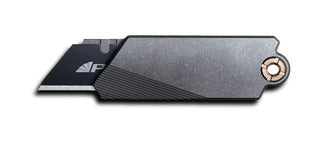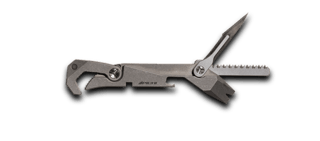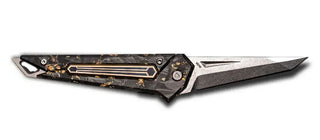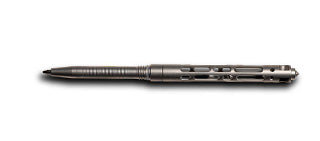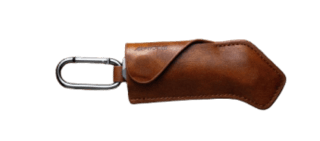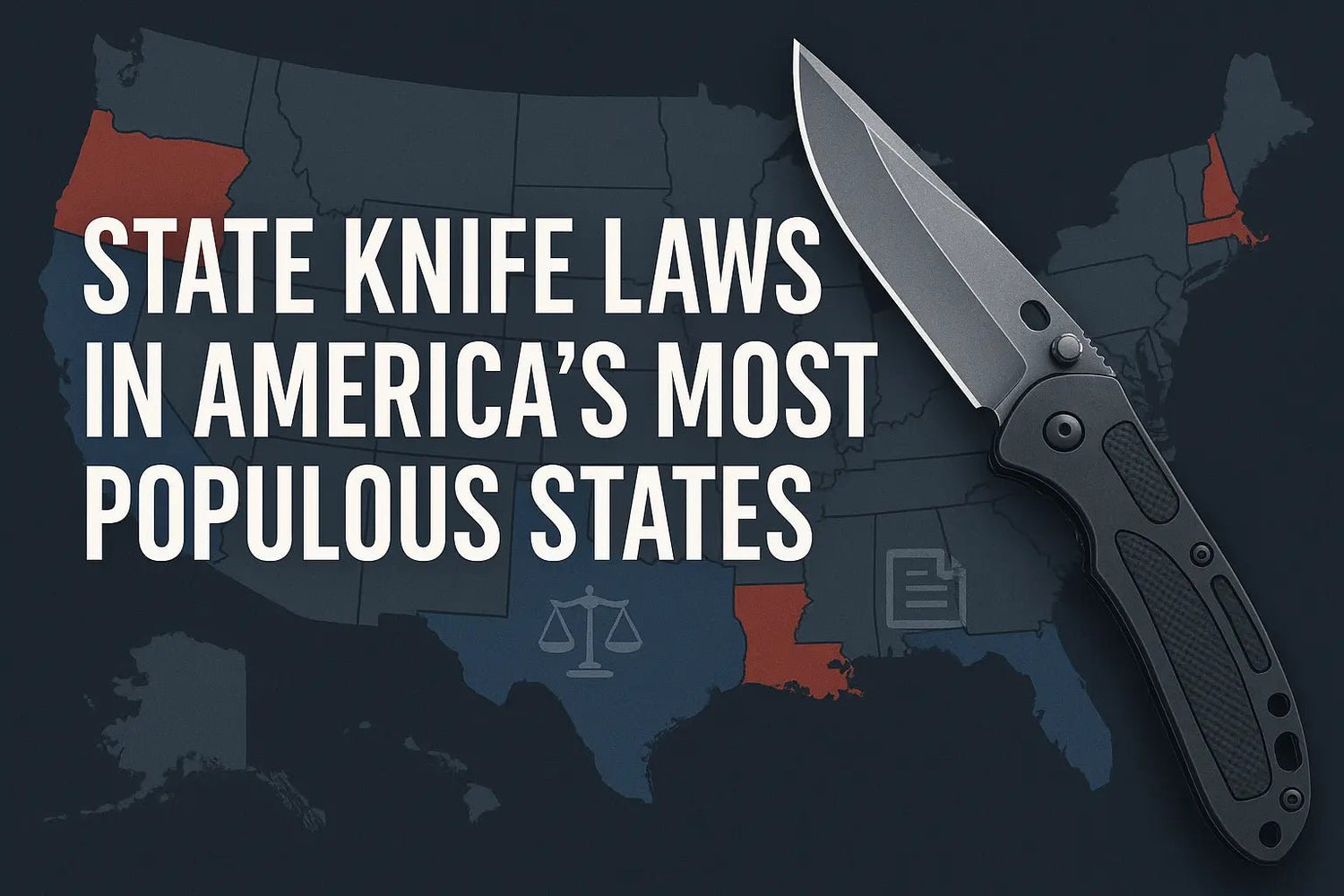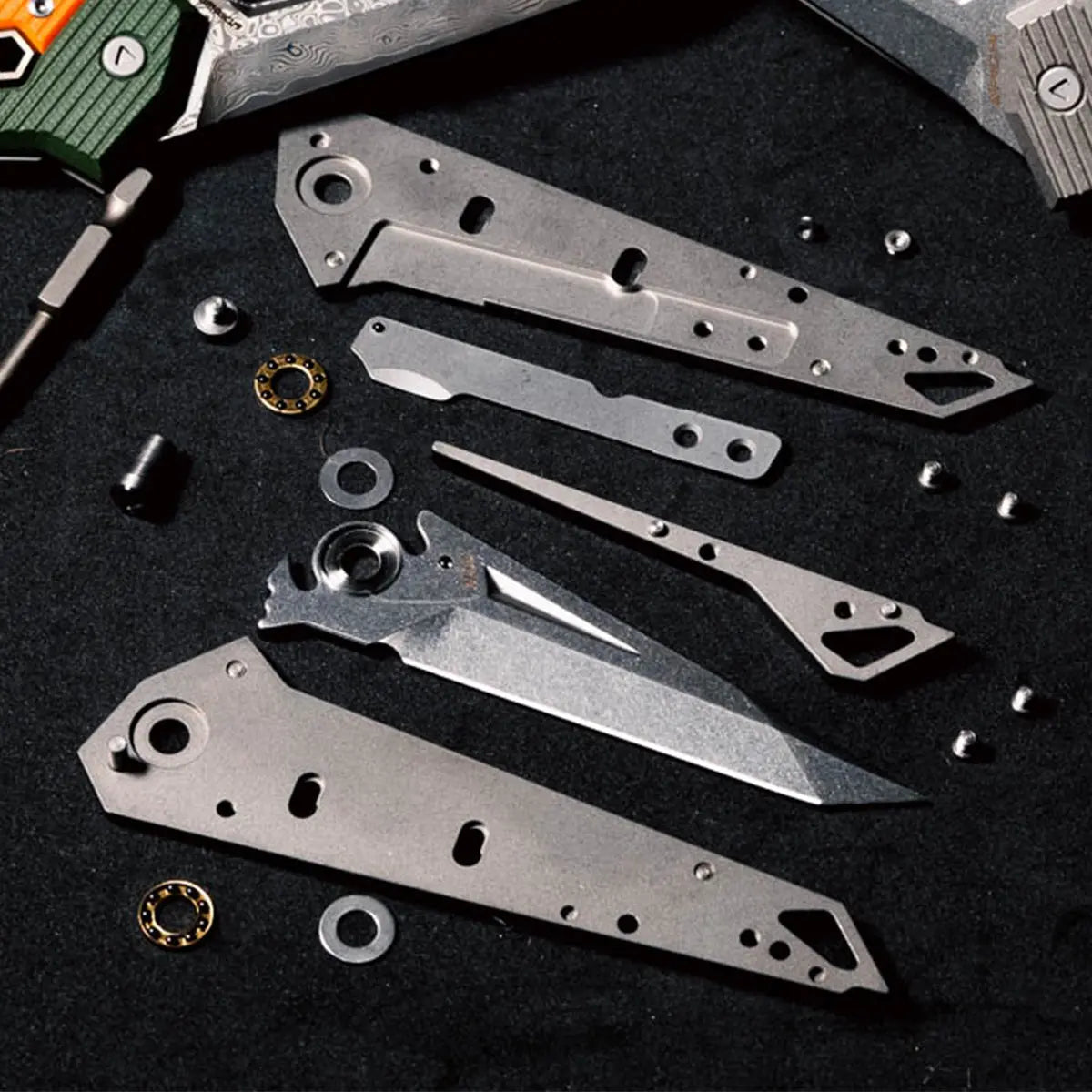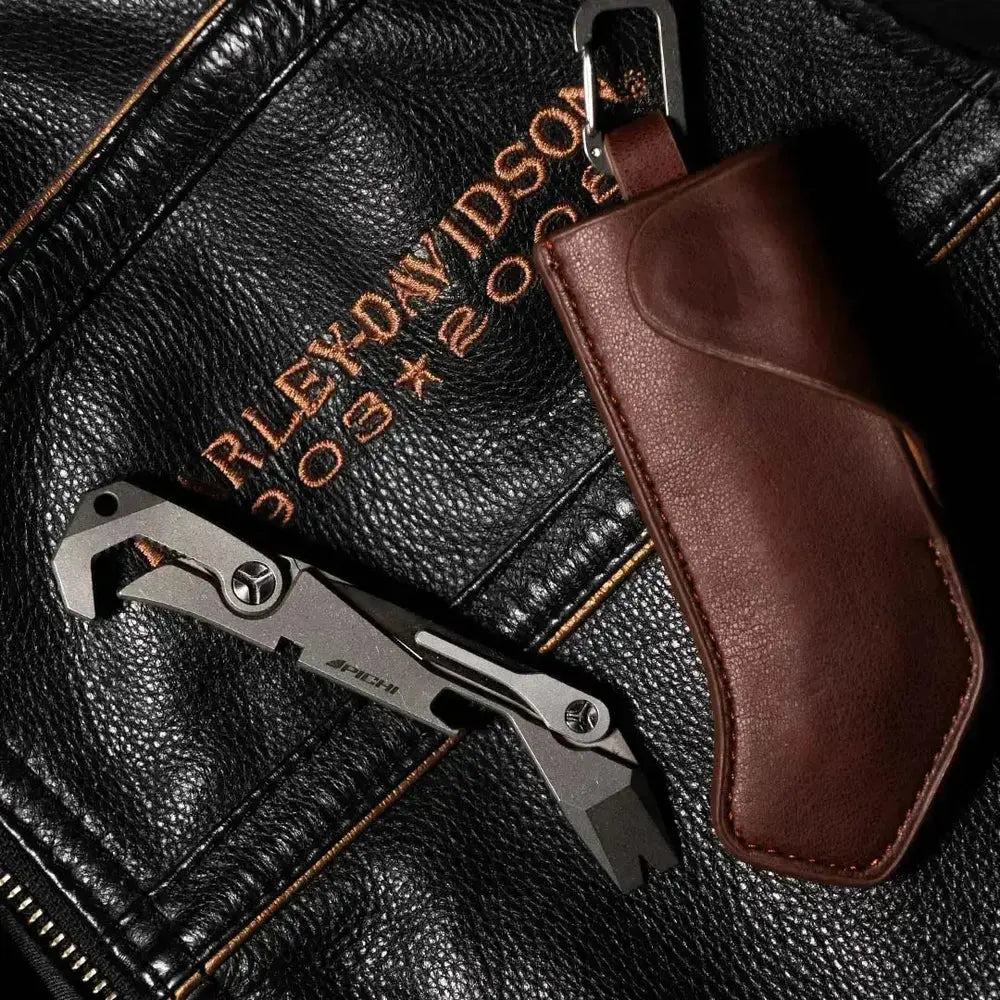Overview: Why Knife Laws Matter to Everyday Carriers
For anyone serious about everyday carry (EDC) gear, understanding knife laws is a foundational part of responsible ownership. Unlike firearms, knives are both tools and potential weapons, which is why they're regulated differently across U.S. states.
For instance, what is perfectly legal in Texas could land you in legal trouble in California or New York. These laws determine whether a knife can be carried openly or concealed, what blade lengths are permitted, and whether assisted-opening or fixed blades are allowed.
With a growing interest in minimalist carry gear, particularly compact knives like those in the PICHI Design Kameta series, EDC enthusiasts must stay informed to avoid unintentional legal violations.
Quick Stats:
-
Estimated knife owners in the U.S.: Over 38 million, with 70% reporting daily or weekly carry for utility or work.
-
Everyday carry (EDC) knife market CAGR: 6.8% through 2028, driven by interest in tactical and utility tools.
-
Annual knife-related stops/arrests: 30,000+ nationwide, most due to violations of carry laws in urban centers.
-
Top knife-buying states: California, Texas, Florida, New York, and Pennsylvania lead in both sales and search trends.

What Counts as an EDC Knife?
EDC knives are tools designed for utility and portability. They are usually compact, sleek, and legal to carry in most jurisdictions when selected carefully. Characteristics often include:
-
Blade length between 2.5" and 4" to comply with state limits.
-
Folding or manual deployment mechanisms instead of automatic or spring-loaded actions.
-
Lightweight materials such as titanium or aluminum for daily comfort.
-
A non-aggressive, practical appearance for blending in with keychains, wallets, or work tools.
PICHI Design's Kameta and G9 Utility knives are tailored specifically for EDC use, featuring stonewashed titanium handles, stonewashed VG10 blades, and deep-pocket carry options to minimize legal and social friction.
Knife laws by state: Top 10 U.S. States
1. California knife laws
California has some of the strictest knife laws in the U.S. Folding knives that are manually opened and have no spring-assist are generally legal. However, switchblades with blades over 2 inches are strictly banned.
Fixed blades, even if small, must be carried openly and cannot be concealed. The law also prohibits knives disguised as other items, such as lipstick tubes or canes.
-
Folding Knives: Legal to carry openly or concealed when folded. This includes pocket knives and Swiss Army knives. However, if the blade locks into place when open, it may be classified as a dirk or dagger and is subject to additional restrictions.
-
Fixed-Blade Knives (Dirks and Daggers): Must be carried openly in a sheath suspended from the waist. Concealing such knives is illegal and can lead to misdemeanor or felony charges.
-
Switchblades: Illegal to carry, possess, or sell if the blade is 2 inches or longer. This includes knives that open automatically by a button, pressure, or gravity.
-
Prohibited Knives: Certain knives are banned, including ballistic knives, belt buckle knives, cane swords, lipstick knives, and writing pen knives. Possession, sale, or manufacture of these can result in criminal charges.
-
Restricted Areas: Carrying knives is prohibited in specific locations:
-
Schools: Knives with blades over 2.5 inches, dirks, daggers, and folding knives with locking blades are banned on school grounds.
-
Public Buildings: Fixed-blade knives over 4 inches are not allowed in state or local public buildings
Understanding and adhering to these laws is crucial to avoid legal complications. Always check local regulations in addition to state laws when carrying knives in California.
2. Texas knife laws
Texas knife laws are much more relaxed. As of 2017, nearly all types of knives became legal, including switchblades and large Bowie knives. However, knives over 5.5 inches are restricted in "location-restricted" areas like schools, bars, or government buildings.
-
Legal Carry: Texas law allows individuals to carry any type of knife, including switchblades, balisongs, and Bowie knives, openly or concealed, provided the blade is 5.5 inches or shorter.
-
Location-Restricted Knives: Knives with blades longer than 5.5 inches are classified as "location-restricted knives." While adults may carry them in most public places, they are prohibited in specific locations, including:
-
Schools and educational institutions
-
Polling places during voting
-
Government buildings
-
Courthouses
-
Racetracks
-
Secure areas of airports
-
Bars and restaurants deriving 51% or more of their income from alcohol sales
-
Correctional facilities
-
Amusement parks
-
Minors: Individuals under 18 years old are prohibited from carrying knives with blades over 5.5 inches, except under specific circumstances, such as being on their own property, in a vehicle, or under direct supervision.
-
Statewide Preemption: Texas enforces statewide preemption, meaning local governments cannot enact knife laws more restrictive than state law. This uniformity ensures consistent regulations across the state.
-
No Restrictions on Carry Method: There are no state-level restrictions on carrying knives openly or concealed, regardless of blade length, outside of the specified prohibited locations.
For everyday carry, a compact folder like the Kameta is perfectly acceptable.
3. Florida knife laws
Florida allows the concealed carry of common pocket knives, but the interpretation of what counts as "common" can vary. Blades under 4 inches are typically safe, but fixed blades or anything with a locking mechanism could be seen as a weapon if not used for lawful purposes. Switchblades are prohibited unless carried with a concealed weapon permit.
Here's a concise overview:
-
Legal Ownership: Most knives, including folding knives, fixed blades, switchblades, and butterfly knives, are legal to own and carry in Florida.
-
Concealed Carry:
-
As of July 1, 2023, individuals aged 21 and over can carry concealed weapons, including knives, without a permit.
-
However, carrying a concealed knife with a blade longer than 4 inches may still be considered carrying a deadly weapon, which can be subject to legal restrictions.
-
Open Carry: Open carry of knives is generally permitted, except for ballistic knives, which are prohibited.
-
Prohibited Knives: Ballistic knives, which propel a blade through a spring or other mechanism, are illegal to manufacture, sell, or possess in Florida.
-
Restricted Locations: Carrying knives is prohibited in certain areas, including schools, government buildings, courthouses, polling places, and secure areas of airports.
-
Minors: Individuals under 18 may carry a pocket knife with parental consent. It is illegal to sell or provide a knife, other than a common pocket knife, to a minor.
Understanding these laws is crucial for responsible knife ownership and to avoid legal complications. Always ensure compliance with both state and local regulations when carrying knives in Florida.
4. New York knife laws
Knife laws in New York vary significantly between state and city levels. While standard folding knives are legal, New York City prohibits visible pocket clips, and knives must not be seen in public. Gravity knives and any knife that can be opened with a flick of the wrist are considered illegal.
New York's knife laws are among the most complex in the United States, with significant differences between state regulations and those enforced within New York City. Here's a detailed overview:
Legal Knives in New York State
-
Folding Knives: Generally legal to own and carry, provided they are not intended for unlawful use.
-
Gravity Knives: Decriminalized in New York State as of May 30, 2019. However, caution is advised as interpretations can vary.
-
Utility and Work Knives: Permissible when used for legitimate purposes such as employment or recreation.
Prohibited Knives in New York State
-
Switchblades: Illegal to possess, manufacture, or sell.
-
Ballistic Knives: Banned due to their projectile capabilities.
-
Metal Knuckle Knives: Prohibited as they combine brass knuckles with a blade.
-
Cane Swords: Illegal as they conceal a blade within a walking cane. Grauman Law P.C.
New York City-Specific Restrictions
-
Blade Length Limit: Carrying knives with blades longer than 4 inches in public is illegal, regardless of whether they are concealed or openly carried.
-
Visibility: Knives must not be visible in public. Even a clip or part of the knife showing can lead to violations.
-
Gravity and Assisted-Opening Knives: Despite state-level decriminalization, NYC maintains restrictions on these knives.
Carry Laws
-
Intent Matters: Carrying any knife with the intent to use it unlawfully against another person is prohibited.
-
Open vs. Concealed Carry: While state law does not differentiate significantly between open and concealed carry, NYC laws are stricter, especially concerning visibility and blade length.
Restricted Locations
Carrying knives is prohibited in certain areas, including:
-
Schools and Educational Institutions
-
Government Buildings
-
Courthouses
-
Public Transportation Facilities
-
Places of Worship
Violations in these areas can lead to severe legal consequences.
Minors
Individuals under 18 are generally prohibited from possessing dangerous knives. Exceptions may apply for educational or employment-related purposes, but it's advisable to consult local laws for specifics.
5. Pennsylvania knife laws
Pennsylvania doesn’t restrict blade length but does ban automatic knives and switchblades. The state law is more focused on the intent of use rather than the type of knife. Concealed carry is permitted unless the knife is intended for unlawful use. This makes compact, non-threatening knives ideal for daily use.
-
Automatic Knives (Switchblades): As of January 2, 2023, it is legal to own and carry automatic knives in Pennsylvania. This change was enacted through House Bill 1929, removing them from the list of prohibited offensive weapons.
-
Other Permissible Knives:
-
Manual folding knives
-
Fixed-blade knives
-
Hunting and utility knives
-
Butterfly (balisong) knives
-
Assisted-opening knives
Prohibited Knives and Restrictions
-
Ballistic Knives: These knives, which propel a blade through a spring mechanism, are illegal to possess, manufacture, or sell in Pennsylvania.
-
Offensive Weapons: Knives intended for unlawful use or with no common lawful purpose are prohibited.
Restricted Locations
Carrying any knife is prohibited in the following locations:
-
Schools (K-12): Both public and private institutions.
-
Court Facilities: Including courthouses.
-
Commonwealth (State) Properties: Compliance with posted rules is required.
Carry Laws
-
Open Carry: Generally permitted for knives not classified as offensive weapons.
-
Concealed Carry: Permitted unless the knife is intended for unlawful use.
6. Illinois knife laws
Illinois limits concealed carry to knives under 3 inches. Anything longer could be considered a weapon and result in legal trouble. Switchblades are banned, and Chicago enforces even stricter regulations, including prohibiting carry near schools and parks.
Choosing a sub-3" EDC knife is a safe approach here.
Legal Knives in Illinois
-
Folding Knives: Generally legal to own and carry, provided there is no intent to use them unlawfully.
-
Fixed-Blade Knives: Legal to own and carry. However, carrying knives with blades longer than 3 inches on public property may be restricted without a valid reason.
-
Butterfly (Balisong) Knives: Legal to own and carry within the state.
-
Automatic Knives (Switchblades): Legal to own and carry only if you possess a valid Firearm Owner’s Identification (FOID) card and are 21 years or older.
Prohibited Knives and Restrictions
-
Ballistic Knives: Illegal to possess, manufacture, or sell in Illinois.
-
Throwing Stars: Prohibited under state law.
-
Knives with Metal Knuckles: Illegal, as they combine brass knuckles with a blade.
Restricted Locations
Carrying knives is prohibited in certain areas, including:
-
Schools and Educational Institutions: Strictly prohibited, regardless of knife type.
-
Government Buildings and Courthouses: Knives are not allowed.
-
Public Transportation Facilities: Carrying knives is restricted.
-
Bars and Establishments Serving Alcohol: Knives are prohibited in venues deriving more than 50% of income from alcohol sales. Noblie
Carry Laws
-
Open Carry: Generally permitted for knives not classified as dangerous weapons. However, local ordinances may impose stricter regulations.
-
Concealed Carry: Carrying a concealed knife with a blade of 3 inches or longer can be considered a violation unless you have a valid reason (e.g., work requirement). (Noblie)
Minors
-
Sale or Transfer: It is unlawful to sell or transfer a "deadly weapon" to individuals under 18. (American Knife and Tool Institute)
Local Ordinances
-
Chicago: Enforces stricter knife laws, including:
-
Blade Length Limit: Prohibits carrying knives with blades longer than 2.5 inches in public.
-
Concealed Carry Restrictions: Carrying concealed knives with blades longer than 2.5 inches is illegal.
Note: Illinois does not have statewide preemption for knife laws, allowing local municipalities to enact their own regulations. Always check local laws before carrying a knife.
7. Ohio knife laws
Ohio has become more lenient in recent years. There are no explicit blade length restrictions, and even switchblades are legal as of 2021.
However, the key is intent: carrying a knife with unlawful intent or in a threatening manner can still result in charges.
Legal Knives in Ohio
-
Permissible Knives: Ohio law permits the ownership and open carry of various knives, including:
-
Folding knives
-
Fixed-blade knives
-
Automatic (switchblade) knives
-
Butterfly (balisong) knives
-
Gravity knives
-
Dirks, daggers, and stilettos
-
There are no statewide restrictions on blade length.
Prohibited Knives
-
Ballistic Knives: Knives with detachable blades that can be ejected via a spring-operated mechanism or other forms of propulsion are illegal to possess, manufacture, or sell in Ohio. (Noblie)
Restricted Locations
Regardless of the type of knife, carrying any "deadly weapon" is prohibited in certain areas:
-
School Safety Zones: Includes schools, school buildings, school premises, school activities, and school buses.American Knife and Tool Institute
-
Courthouses: Any building housing a courtroom.American Knife and Tool Institute
-
Correctional Facilities: Possession of a deadly weapon while under detention is prohibited. (American Knife and Tool Institute)
Violations in these areas can lead to felony charges.
Carry Laws
-
Open Carry: Generally permitted for all legal knives.
-
Concealed Carry: As of April 12, 2021, carrying a concealed knife is legal provided it is not used as a weapon. A knife is considered a "deadly weapon" if it is used or intended to be used as a weapon.
Minors
-
Sale or Transfer: It is unlawful to sell, buy, furnish, or give to a minor a switchblade knife or any similar weapon. Additionally, minors are prohibited from possessing knives with blades of 2.5 inches or more, except when used for food preparation or household/business purposes.
Local Ordinances
-
Statewide Preemption: Effective September 13, 2022, Ohio law prohibits local governments from enacting knife regulations that are more restrictive than state law. Homestead Authority
Understanding and adhering to Ohio's knife laws is essential for responsible knife ownership and to avoid legal complications. Always ensure compliance with both state and local regulations when carrying knives in Ohio.
8. Georgia knife laws
Georgia allows the carry of knives with blades up to 12 inches without a permit. Any knife over 12 inches requires a weapons license. Most folding knives and EDC tools fall well below this threshold and are legal for open or concealed carry.
Legal Knives in Georgia
Georgia law does not prohibit the ownership of any specific type of knife. This includes: (BLADE ADDICT)
-
Folding knives
-
Fixed-blade knives
-
Automatic (switchblade) knives
-
Butterfly (balisong) knives
-
Gravity knives
-
Dirks, daggers, and stilettos
-
Throwing knives and stars
-
Disguised knives (e.g., belt buckle knives, cane knives)
-
Ballistic knives
Ownership of these knives is legal without restriction.
Blade Length Restrictions
-
**Knives with blades 12 inches or less: May be carried openly or concealed without a permit.
-
**Knives with blades over 12 inches: Classified as weapons; carrying requires a valid Georgia Weapons Carry License (WCL)
Restricted Locations
Regardless of blade length or permit status, carrying knives is prohibited in certain areas:
-
Schools and educational institutions
-
Government buildings
-
Courthouses
-
Jails and prisons
-
Nuclear power facilities
-
Places of worship, unless permitted by the governing body
-
Polling places during elections
Violations can result in misdemeanour or felony charges, depending on the location and circumstances. (Tosahwi Knives Official)
Minors and Knife Ownership
-
Under 18 years old:
-
May own and carry knives with blades 12 inches or less.
-
Prohibited from carrying knives with blades over 12 inches without a WCL.
-
It is illegal to sell or transfer a knife considered a deadly weapon to a minor.
Local Ordinances and State Preemption
Georgia enforces statewide preemption, meaning local governments cannot enact knife laws more restrictive than state law. This ensures uniformity across the state, so a knife legal in one city is legal in all others.
Penalties for Violations
-
Carrying a knife over 12 inches without a WCL:
-
Classified as a misdemeanor offense.Tosahwi Knives Official
-
Carrying a knife in a prohibited area:
-
Can result in felony charges, with penalties including fines and imprisonment. (Tosahwi Knives Official)
Note: While Georgia's knife laws are permissive, it's essential to stay informed about specific regulations, especially when traveling or entering restricted areas. Always ensure compliance with both state and local laws.
9. North Carolina knife laws
North Carolina permits open carry of most knives, but has restrictions on concealed carry for fixed blades and certain automatic knives. Folding knives are generally acceptable as long as they are not spring-assisted or designed as weapons.
Legal Knives in North Carolina
Most knives are legal to own and carry openly in North Carolina, including:
-
Folding Knives: Common pocket knives are generally permissible.
-
Fixed-Blade Knives: Such as hunting knives and bowie knives.
-
Butterfly (Balisong) Knives: Legal to own and carry openly.
-
Gravity Knives: Permitted under state law.
It's important to note that while these knives are legal to own and openly carry, certain restrictions apply to concealed carry and specific locations.
Prohibited Knives and Restrictions
Certain knives are restricted or prohibited in North Carolina:
-
Ballistic Knives: Illegal to possess or carry.
-
Spring-Loaded Projectile Knives: Prohibited under state law.
-
Concealed Carry Restrictions: Carrying concealed bowie knives, dirks, daggers, or similar weapons is illegal unless on one's own premises.
Additionally, carrying any knife, regardless of type, is prohibited in specific locations such as schools and government buildings.
Carry Laws
-
Open Carry: Generally permitted for most knives, provided they are not carried in restricted areas.
-
Concealed Carry: Restricted for certain knives. Concealed carry of ordinary pocket knives is typically allowed, but carrying concealed bowie knives, dirks, daggers, or similar weapons is prohibited unless on one's own premises.Knifeade
It's essential to understand the distinction between open and concealed carry to ensure compliance with state laws.
Restricted Locations
Carrying knives is prohibited in the following areas:
-
Educational Institutions: Including schools and universities.
-
Government Buildings: Such as courthouses and state offices.
-
Public Events: Certain public gatherings may have restrictions on carrying weapons, including knives.
Violating these restrictions can result in legal penalties, including fines and potential jail time.
Minors
Individuals under 18 years old are generally prohibited from purchasing or possessing certain types of knives without parental consent.Knifeade
Note: While North Carolina does not have statewide preemption laws regarding knives, meaning local municipalities can enact their own regulations, it's crucial to stay informed about both state and local laws to ensure compliance.
10. Michigan knife laws
Michigan's knife laws emphasize the type of knife over the size. Daggers, dirks, and other double-edged knives are illegal to conceal, while folders with a single edge are mostly legal. Switchblades are banned. Intent and behavior matter more than specs.
Legal Knives in Michigan
Under state law, the following knives are legal to own and carry openly:
-
Folding Pocket Knives: Generally permissible, especially with blades under 3 inches.
-
Fixed-Blade Knives: Legal to own; however, carrying them concealed may be restricted depending on blade length and intent.
Automatic (Switchblade) Knives: Legal to own and carry openly since the 2017 repeal of the prohibition. (American Knife and Tool Institute) -
Butterfly (Balisong) Knives: Legal to own and carry openly.
-
Gravity Knives: Legal to own and carry openly.
-
Throwing Knives and Stars: Legal to own; carry restrictions may apply based on intent.
-
Disguised Knives: Items like cane knives or lipstick knives are legal to own; carrying them concealed may be subject to restrictions.Blade City+1Couteaux Morta+1
Prohibited Knives and Restrictions
While Michigan does not categorically ban specific knife types, certain restrictions apply:
-
Concealed Carry Prohibitions: It is illegal to carry concealed
-
Double-Edged Non-Folding Stabbing Instruments: Such as daggers, dirks, or stilettos.
-
Any Knife Deemed a "Dangerous Weapon": Based on intent to use unlawfully against another person.
-
Intent Matters: Carrying any knife with the intent to use it unlawfully against another person is prohibited.
-
Vehicle Carry: Transporting knives in a vehicle is considered concealed carry; thus, carrying prohibited knives in a vehicle is illegal unless stored out of reach, such as in the trunk.
Carry Laws
-
Open Carry: Generally permitted for most knives, provided there is no intent to use them unlawfully.
-
Concealed Carry: Restricted for certain knives as outlined above. Folding pocket knives with blades under 3 inches are typically permissible to carry concealed.
Restricted Locations
Carrying knives is prohibited in the following areas:
-
Schools (K-12): Both public and private institutions, including school buses.
-
Government Buildings and Courthouses: Knives are not allowed.
Public Transportation Facilities: Carrying knives is restricted. -
Public Parks and Recreation Areas: Subject to local ordinances.
Minors
Michigan law does not specify age-based restrictions for knife possession. However, minors are subject to the same carry laws as adults and may face school disciplinary actions if found with knives on school property.
Note: Understanding and adhering to Michigan's knife laws is essential for responsible knife ownership and to avoid legal issues. Always ensure compliance with both state and local regulations when carrying knives in Michigan.
EDC Buyer Insight: Design with the Law in Mind
Every product we design at PICHI takes legal carry into account. Our knives feature:
-
No spring-assist or automatic deployment.
-
Sub-3.5” blade lengths ideal for most U.S. states.
-
Lightweight, rust-resistant titanium handles that provide utility, not intimidation.
This means your knife is more likely to be seen as a tool than a weapon, which is crucial when laws hinge on perceived intent.
Frequently Asked Questions
Q1: Can I carry my PICHI Kameta EDC Knife in Texas or Florida?
Yes. In Texas, it’s fully legal. In Florida, it’s fine as a pocket knife under 4” and if not used in a threatening manner.
Q2: Are folding knives legal in New York?
Yes, but they must not be visible. Avoid clips showing and never carry assisted or gravity-style folders in NYC.
Q3: Does blade length matter for legality?
Yes. States like Illinois, Florida, and California impose strict length rules. Under 3” is safest in most cases.
Q4: Are fixed blades legal to carry?
Only in some states and typically when carried openly. Folding knives are legally safer for EDC use.

